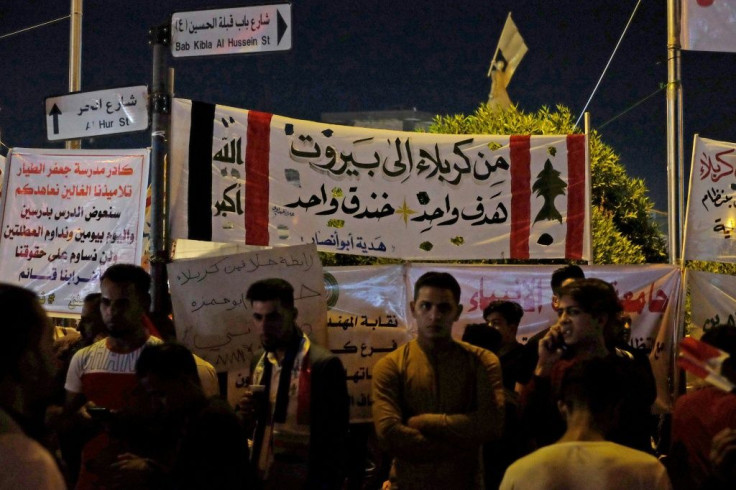'Sister Protests': Lebanon, Iraq Look To Each Other

A Lebanese flag flutters in the protest-hit Iraqi capital. More than 900 kilometres (500 miles) away, a revolutionary Iraqi chant rings out from a bustling protest square in Beirut.
"Don't trust the rumours, they're a group of thieves," sings a group of Lebanese musicians in Iraqi dialect, referring to political leaders they deem incompetent and corrupt.
"The identity is Lebanese," they continue, reworking the chant by Iraqi preacher Ali Yusef al-Karbalai, made popular during the street movement there.
Such recent shows of solidarity have become a common feature of protest squares in the two countries, where corruption, unemployment and appalling public services have fuelled unprecedented street movements demanding the ouster of an entire political class.
They serve to "shed light on similarities between the two movements and boost morale", said Farah Qadour, a Lebanese oud musician.
"The two streets are observing and learning from each other," said the 26-year-old who is part of the group that adopted al-Karbalai's chant.
In Lebanon's southern city of Nabatiyeh, hundreds brandishing Lebanese flags chanted: "From Iraq to Beirut, one revolution that never dies."
And in the northern city of Tripoli, dubbed the "bride" of Lebanon's protest movement, a man standing on a podium waved a wooden pole bearing the flags of the two countries.
"From Lebanon to Iraq, our pain is one, our right is one, and victory is near," read a sign raised during another protest, outside Beirut's state-run electricity company.
In Tahrir Square, the beating heart of Baghdad's month-old protest movement, demonstrators are selling Lebanese flags alongside Iraqi ones.
They have hung some on the abandoned Turkish restaurant, turned by Iraqi demonstrators into a protest control tower.
Banners reading "from Beirut to Baghdad, one revolution against the corrupt" could be seen throughout.
Lebanon and Iraq are ranked amongst the most corrupt countries in the region by anti-graft watchdog Transparency International, with Iraq listed as the 12th most corrupt in the world.
Public debt levels in both countries are relatively high, with the rate in Lebanon exceeding 150 percent of gross domestic product (GDP).
"What's happening on the streets in Iraq and Lebanon, they're sister protests," said Samah, a 28-year-old Lebanese demonstrator.
"They're the result of an accumulation" of years of problems.

One video that went viral on social media networks showed a masked Iraqi protester dressed in military fatigues demanding the resignation of Lebanese Foreign Minister Gebran Bassil, one of the main targets of protesters in the small Mediterranean country.
In a video released online, a group of young Iraqi men had filmed themselves singing, "Lebanon, we're with you!"
The two movements also seem to be adopting similar protest strategies.
In both countries, rows of parked vehicles have blocked traffic along main thoroughfares in recent weeks.
University-aged demonstrators wearing medical masks or eye goggles have occupied bridges and flyovers, refusing to believe pledges of reform from both governments.
The big difference is that in Iraq, the demonstrations have turned deadly, with more than 300 people, mostly protesters but also including security forces, killed since the movement started October 1.
Lebanon's street movement, which started on October 17, has been largely incident-free despite scuffles with security forces and counter-demonstrators rallying in support of established parties.
The two movements, however, are united in their anger about the kind of political system that prioritises power-sharing between sects over good governance.
The consecutive governments born out of this system have been prone to deadlock and have failed to meet popular demands for better living conditions.
"We are united by a sense of patriotic duty in confronting this sectarian political system," said Obeida, a 29-year-old protester from Tripoli.
He said he had high hopes for Iraqi protesters because the sectarian power-sharing system there is relatively new, having emerged after the fall of Saddam Hussein in 2003.
"In Lebanon, it's more entrenched," he said of the arrangement that ended the country's 1975-1990 civil war.
On a Beirut waterfront, dotted with luxury restaurants and cafes, a 70-year-old Iraqi man who has been living in Lebanon for five years looked on as demonstrators laid out picnic blankets on the grass.
With a Lebanese flag wrapped around his neck, Fawzi said the protests looked different but reminded him of those back home.
"The goal is one," he said.
bur-ho-mjg/jmm/ah/fz
© Copyright AFP 2024. All rights reserved.





















